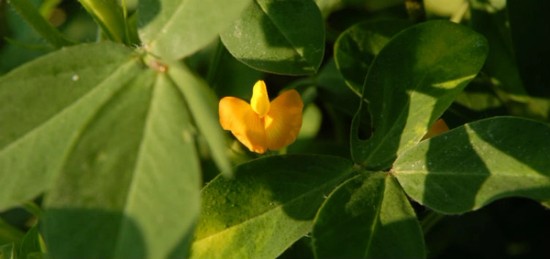Bees are practical insects. When they want to find nectar to make honey, they go to the flowers with the most sumptuous food. As it happens, peanut flowers are one of the least attractive sources of nectar or pollen for bees.
While peanuts may not be an attractive choice for the bee, they are highly desirable for the person who wants to choose sustainably sourced foods.
Peanuts are one of the most sustainable and environmentally friendly food sources available today. A feature of its growing cycle — self-pollination — makes peanuts environmentally friendly. Self-pollination means peanuts do not require outside aid — such as bees, other insects or the wind — to carry pollen from one plant to another in reproduction. Very few plants pollinate independently of insects, bees or wind. Self-pollination is most often seen in legumes (peanuts are legumes) and in many kinds of orchids, peas, sunflowers and daisies.
Self-pollinators are good for the environment and efficient plants to grow. They use less energy because they do not need to attract bees or other insects to reproduce. Peanuts can be planted in geographical areas where pollinators are scarce or absent.
“Not relying on insects for pollination sets the peanut in a whole different category from many other crops where pollinators are more vulnerable,” said Steve Brown, executive director for The Peanut Foundation and former entomologist at the University of Georgia.
Everyone recognizes that bees and other pollinators are important to a healthy ecosystem. But if a farmer must give time and attention to maintaining a bee population alongside managing a crop, he or she must plan for the bees to be impacted by things in nature (weather, climate, harmful insects) and man-made activities (cost of maintaining bee population and agricultural practices). Peanuts growing in the field can be impacted by similar events, but they do not have the additional expense and effort of depending on insects.
Even though peanuts don’t require insects for pollination, peanut farmers care about a vibrant bee and insect population. Many farmers encourage pollinators by providing natural habitats around the edges of their land or growing plants to intentionally attract beneficial insects or butterflies.
Virtually all farmers, including peanut farmers, must use some kind of insect management program to ensure a healthy crop. Fortunately for the environment, growing peanuts requires less applications of insecticide. Nearly all applications to control harmful insects are applied early to the soil and not to the foliage (leaves) of the growing plant. And these applications happen before the peanut plants begin to flower (attracting the minimal number of pollinators attracted to peanut flowers in the first place).
Several peanut-growing states have developed pollinator protection plans to protect beneficial bees and other insects. These published plans include voluntary guidelines for pollinator protection and give practical steps that beekeepers, farmers and other citizens can take to ensure a healthy environment.
Studies show that we are all becoming more eco-conscious and sustainability focused. The self-pollination capability of the peanut plant gives one more reason to enjoy nutritious, delicious and sustainable peanuts.
